Operation Snowball: the first time experience
Conant’s annual Operation Snowball took place on Saturday, March 9. As many Conant students don’t know what the event is, I attended Operation Snowball to give personal insight into the experience.
When you look up Operation Snowball online, you will most likely find results relating to mental health awareness or drug abuse prevention, but the program isn’t just about that. It is more so a day based on building connections with your school community through team-building activities, which is what makes Operation Snowball difficult to explain unless you actually attend it yourself.
The event started with checking in to the cafeteria and handing in our phones for the day, followed by ice breaker games with all the students gathered in a circle in the cafeteria. After getting to know each other a bit, featured Operation Snowball guest speaker Kate Garnes, author and motivational speaker, spoke about self-esteem, surrounding yourself with positive voices and the people who want the best for you, as well as ways to get through life during difficult times. Then she offered a workshop that consisted of a demonstration about why it’s important to make yourself heard, where she spoke about the importance of truly listening to the people in our lives.
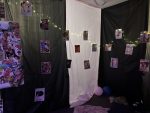 Zehra Ozcan | Conant Crier
Zehra Ozcan | Conant Crier 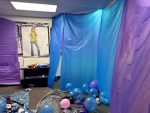 Zehra Ozcan | Conant Crier
Zehra Ozcan | Conant Crier Then we all split up into our small groups, numbered 1-8, and went to our assigned rooms in the English hallway which were all decorated with colorful posters of movies and songs and warm lights, and supplied with snacks to create a welcoming, cozy atmosphere. The group leaders, who have been working with Operation Snowball all year and have been trained to lead the event, led the group discussion as we got to know the people we would be spending the whole day with.
After getting to know each other in small groups, we went back to the cafeteria around noon for lunch, which consisted of sandwiches, fruit, drinks, and candy. After eating, we were free to get up and dance to the music the sponsors had playing, and it was a nice time to talk with friends in other groups or meet new people.
At 1:30, we headed back to our small groups in the classrooms in the English hallway. Each group was free to do whatever they wanted – some played card games, others stepped out into the hallway to hang out. In my group, we shared childhood stories which not only gave us something fun to talk about – turns out pretty much everyone in my group had had some funny cooking accident when they were younger, whether it be forgetting to put water in the pot while making box macaroni and cheese or thinking potatoes could cook in the oven in 10 minutes – but also made the environment more comfortable as we got to know each other better.
Then we had our first group workshop, which focused on the topic of setting goals. We each wrote down 4 goals: one you want to achieve by May, one you want to achieve by the end of the summer, one you want to achieve in your 20s, and one lifelong goal. Math teacher Mary Toman, who was leading the workshop, asked some students to share their goals and we discussed as a group why they were important and why we wanted to achieve them.
Toman emphasized how important the “why” behind a goal is: if you don’t know why you want to achieve something, or you only want to do it to receive validation from someone else or get into college, then you probably don’t really want it and won’t want to work hard to achieve it.
A tactic she shared to make good goals was to ask yourself “why” 5 times. For example, your goal could be getting into a certain college. If you ask yourself why, your answer might be that the college has a really good program for engineering which is what you want to do. Then keep asking yourself why, until you find the true motivation behind that goal, which in this example, might be something like wanting to develop those skills in the career you want to help address an issue you are passionate about.
At 2:15, we moved on to our second workshop, which was intended to help us let go of negative memories that were holding us back. The workshop was led by Lizzy Petrov ‘26, one of the student leaders at Operation Snowball.
We started with getting one notecard and a marker and writing down a negative memory, a time when something had made us feel terrible about ourselves. Then we ripped this paper into pieces, and with our groups, tried to make a tower out of these pieces, which didn’t work because the pieces of paper were so tiny.
Then we repeated the process but with a positive memory this time. Each person received a pair of colorful sunglasses (we got to keep them) which symbolized a new perspective on life. We were free to write on the notecard either a positive memory or what our new outlook on ourselves would be. Then we made a tower with these notecards without ripping them up, and this time the tower was stronger.
Although these activities might seem cliche, it’s not necessarily the activities in the workshops themselves that make an impact, it’s the fact that we were all working in a group. You can do the same things at home yourself, but doing it at Operation Snowball, surrounded by other people who you can empathize with, has a bigger impact.
At 3:00, we went back to the cafeteria for a series of team-building games, which was one of the most entertaining parts of the day in my opinion.
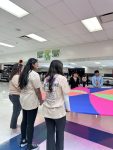 Zehra Ozcan | Conant Crier
Zehra Ozcan | Conant Crier Operation Snowball attendees participate in parachute game.
The games varied from ones that involved competing with other groups to try to beat their records, such as carrying a tennis ball across 10 feet on a small ring which everyone held on to with a string tied to it and putting the ball on top of a small tube without it falling. There were also more challenging games such as holding on to a piece of rope blindfolded as a group and trying to form a square shape with the rope.
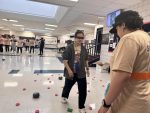 Zehra Ozcan | Conant Crier
Zehra Ozcan | Conant Crier Operation Snowball participants try to lead their partner through a track of obstacles while they are blindfolded, building a sense of partnership.
This continued until around 4:15, when we returned to our rooms and hung out with our newfound friends until dinner at 4:45. The meal lasted until 6:30 and consisted of plenty of pizza, pasta, bread rolls, salad, and cookies.
Everybody gathered around in a circle, and one of the advisors stood in the middle, reading out loud statements that people could step forward to if the statement applied to them, or remain behind if the statement did not apply to them or they did not wish to share. The statements varied in range from more casual ones like, “I am the oldest child in the family” to much more emotional ones like, “I feel I am worthy of love and pride.”
This activity lasted quite a while, and afterward, we went back to our small groups and shared our thoughts. Some recurring themes were that it was heartbreaking to see your friends step forward to statements that you would not expect them to step forward to and that it was hard seeing so many people think such negative things about themselves.
Our final activity after Cross the Line was another activity called “Angels.” For this activity, we went to the cafeteria and each group sat separately in circles. Numbered 1 through 8, each group stood up one by one while the others remained sitting on the ground with their eyes closed. Event organizer Mrs. Ashley Ray read statements like “touch the shoulder of someone who made you smile today” and members of the group standing walked around to tap the shoulder of the people who made them smile. This way, we uplifted other students and made them feel appreciated without directly telling them.
When our final activity ended, we went back to our rooms, hung out, and helped the leaders clean up the decorations in each room. When we were done, we met in the cafeteria to say goodbye, got our phones back, and Operation Snowball was over.
I thoroughly enjoyed my experience at Operation Snowball. I not only learned to have more gratitude and made amazing new friends, but also had a really fun time overall, with all the activities the event offered. You can talk to Ms. Ray if you are interested in becoming a leader at Operation Snowball in the upcoming years. If you are interested in participating in the event, watch out for more information about it next year and make sure to sign up.

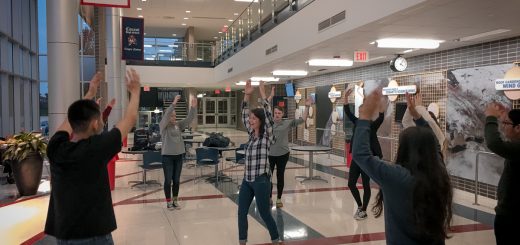
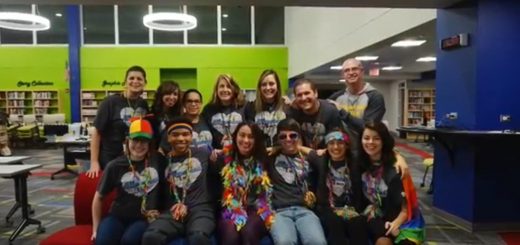

Recent Comments